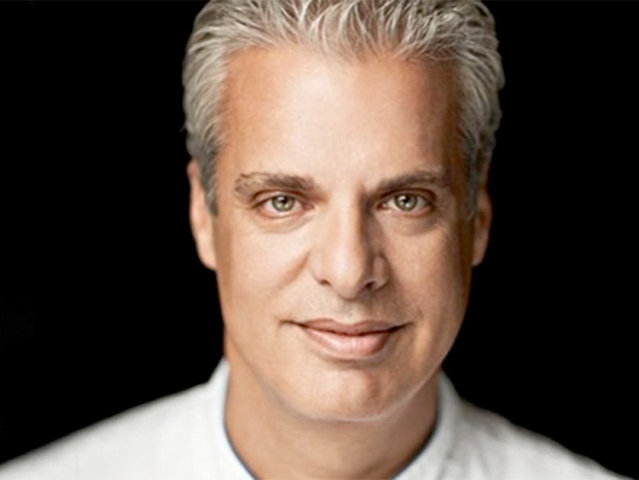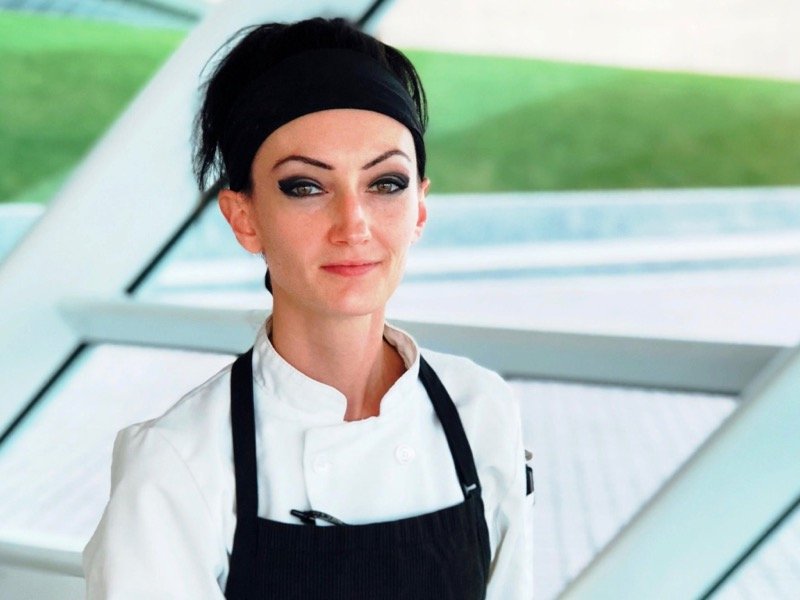Offstage, they’re pals, but onstage they are ferocious competitors.
It's roast for dinner tonight when Anthony Bourdain and Eric Ripert debate good versus evil at the Riverside Theater. Bourdain, best known for his shows "Anthony Bourdain: No Reservations" and "The Layover" on the Travel Channel, and Ripert, the chef behind multi-Michelin-starred Le Bernardin in New York as well as the host of PBS’s "Avec Eric" and a regular on "Top Chef," plan to share stories and muse on the place of food in life from behind the kitchen doors.
If Ripert is The Good One, then Bourdain is definitely The Evil One. And this show will definitely be a battle of wits as Bourdain’s salty tongue meets the sugary sweet retorts of Ripert. I’ve been told the display on stage is similar to that of two lawyers playing for high stakes in a courtroom battle with a take-no-prisoners attitude.
Of course, guests will also get a shot at grilling the two during a question and answer session, which should prove to be an even more interesting spectacle.
I managed to catch up with Ripert while he was in Chicago preparing for the show there, and had a brief chat with him about the show, his feelings about women in the profession, and his advice on the best ways to handle fresh seafood.
OnMilwaukee.com: First, have you ever been to Milwaukee?
Eric Ripert: No, never. First time. I’m excited.
OMC: Is there anything you’re looking forward to doing while you’re here?
ER: I’d love a good place to sit down for lunch. Do you have any places that you recommend?
OMC: Lunch is a bit more tricky than dinner, so I’d like to give that some thought. Can I get back to you?
ER: Certainly. You have my number, you can text me.
OMC: Great. I’ll do that.
ER: Maybe one of the Bartolotta’s restaurants?
OMC: Yes, I’ll send you some suggestions.
ER: Wonderful.
OMC: Do you have any other plans while you’re in the city?
ER: We’ll leave tomorrow early from Chicago. Each time we visit a city, I walk for a couple of hours, and then we have a good lunch, and then we get back to the theater for the show. I always like to make sure I walk around the city – even big cities like Los Angeles. So, I’ll do that.
OMC: The story goes that you and Anthony Bourdain met when you called him after you read "Kitchen Confidential." Do you think you still would have been friends with him if he hadn’t said such nice things about you in the book?
ER: I don’t think … well, maybe I would have called him. Many times when people disagree with me, I’ll call them and ask them to talk. I’m always curious in people, so I do think I probably would have called him. But, it’s always so much better when they are complimentary.
OMC: So, you were destined to be friends?
ER: Yes, I guess so. (Laughs)
OMC: What can we expect from the two of you on stage?
ER: Well, what surprised me is that the show lasts about two hours and people laugh most of the time – 90 percent of the time, they’re laughing. But, when the people leave afterward, they also feel a little bit inspired. So, it’s comedy, but also inspiration. I really like that about it.
The show is really in three acts. The first is Tony roasting me and me returning the favor. The second act is us sitting down and talking about different topics of the food industry. Often we talk about sustainability or some such topic. We don’t have a scripted show, so we talk about a lot of different things, depending on what’s going on. The last portion, which is very interesting, is left for the guests to ask us questions.
OMC: What are some of the most interesting questions you’ve been asked?
ER: We have done about 30 shows, so there have been a lot of great questions. But, I like when people ask … when people new to the industry ask advice to both of us. Because we have more or less the same views, but some differences. If you are coming to our industry to be rich and famous… wrong. You are wrong. It’s not glamorous. You really have to test your passion before coming.
OMC: What’s the most surprising thing the two of you have in common?
ER: You know, it’s not surprising to me, but Anthony is extremely disciplined and very rigorous and very hard at work. He always make believes that he’s light and funny and making fun, but he’s very intense in a sense, and I think I am the same. We both work very hard and are very passionate. And I think people don’t see that side of Tony when he is performing.
OMC: Speaking of good versus evil, earlier this month, you sparked a debate on female chefs on Twitter. Did you intentionally leave female chefs out of the conversation?
ER: No, I didn’t. I was asking my friends. I was asking my close friends. It didn’t even occur to me that I was leaving anyone out.
My business partner Maguy Le Coze just won for best restaurateur, and she’s probably the only one in the world who owns a restaurant like Le Bernardin. So, I asked, would you like to be considered best female restaurateur?
OMC: What’s your answer to the question: Should the food industry single out the accomplishments of female chefs, because they are female?
ER: No, not at all. Obviously not. When a woman cooks well, and a man cooks well, that’s it. If I was a woman, I would be insulted if I were segregated. I was actually defending women in my tweet. If I were in their shoes, I would wonder why they were segregating me.
It’s much like choosing best chef over 50? Under 50? It doesn’t make sense.
Men are built in a different way from women. We all know that. So, we often separate them because of their physical characteristics. But, not cooking. When a man or woman makes a great meal, it’s all the same.
OMC: Back to the kitchen. You’re considered by many as the best seafood chef in the United States — and by some, in the world. Here in Wisconsin, we have access to a wide variety of lake fish (bluegill, perch, trout). What are a couple of things home cooks need to know about preparation of these types of fish?
ER: When you talk about fish, what’s most important is the freshness of the product. Fish never smells like fish. If it smells like fish, you shouldn’t be cooking or eating it. That’s mistake number one that people make. When you buy old fish, no matter what you do it will be mediocre.
The second thing is that people have a tendency to overcook fish. It’s just not good … the texture.
The third thing is that people have a tendency to complicate things too much when preparing fish. Great fish is something that is often times very simple.
So, those are the three biggest mistakes – freshness, overcooking and making things too complicated.
OMC: Since you deal with seafood every day, what are your thoughts and practices on sustainable seafood?
ER: It’s very simple. If we are not cautious and careful about what’s going on in the ocean, in 20, 30 years a lot of fish will not be available anymore. So, it’s a matter of not overfishing, not destroying the beds in the ocean, controlling the amount of bycatch.
I’m happy to see that a lot of people have an interest in this area because 30 years ago we didn’t even think about this sort of thing. The American element is very proactive. There’s an organization called NOAA that’s very well respected. They have the resources to provide facts about what is currently going on with the fishing.
OMC: So you would recommend them as a resource?
ER: Yes, their lists are …fairly accurate.
OMC: Do you feel that it is the responsibility of chefs to set the bar for sustainable practices?
ER: Yes. If we are visible and if people are listening to us because we have some level of celebrity and therefore we are ambassadors, we have the responsibility to set an example.
Tickets are still available for "Good vs. Evil: An Evening with Anthony Bourdain and Eric Ripert" at The Riverside this evening. Tickets can be purchased online, along with special pre-show dinner packages for area restaurants including Harbor House, Bacchus, The Rumpus Room or Lake Park Bistro.
As a passionate champion of the local dining scene, Lori has reimagined the restaurant critic's role into that of a trusted dining concierge, guiding food lovers to delightful culinary discoveries and memorable experiences.
Lori is an avid cook whose accrual of condiments and spices is rivaled only by her cookbook collection. Her passion for the culinary industry was birthed while balancing A&W root beer mugs as a teenage carhop, fed by insatiable curiosity and fueled by the people whose stories entwine with every dish. Lori is the author of two books: the "Wisconsin Field to Fork" cookbook and "Milwaukee Food". Her work has garnered journalism awards from entities including the Milwaukee Press Club. In 2024, Lori was honored with a "Top 20 Women in Hospitality to Watch" award by the Wisconsin Restaurant Association.
When she’s not eating, photographing food, writing or planning for TV and radio spots, you’ll find Lori seeking out adventures with her husband Paul, traveling, cooking, reading, learning, snuggling with her cats and looking for ways to make a difference.







